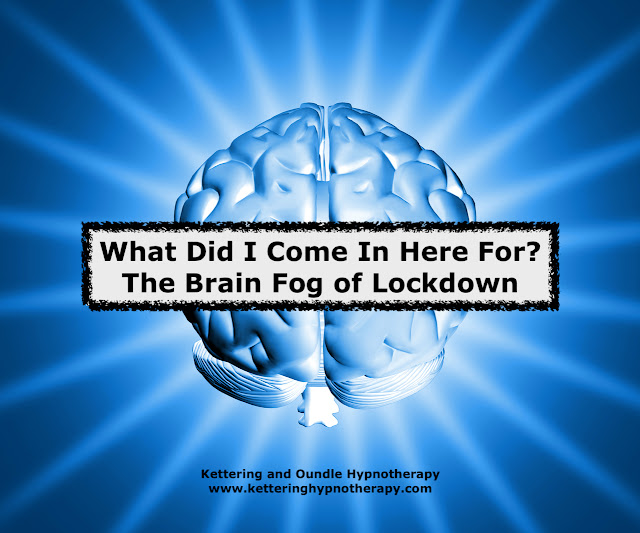What Did I Come In Here For? The Brain Fog Of Lockdown
Did you find it hard to concentrate on anything during the lockdown? Perhaps you found your memory was worse, what has commonly been called brain fog? How many times have you felt exhausted after a day of online meetings?
You were not alone. The good news is that as we come out of the restrictions we are likely to find the fog will clear, but researchers are interested in why this happened.
I read an interesting article in the Guardian today, that explored some of the work that has been going on studying the behavioural and cognitive effects of a restricted lifestyle during the lockdown, and I wanted to share some of the points as a way of reassuring ourselves that it appears to be a normal psychological response.
A Normal Response to Abnormal Circumstances
Psychologists agree that cognitive impairment is an expected response to trauma. We remind ourselves that trauma is as much the change to our everyday routine as being directly affected by the pandemic itself. We remember that overnight (literally) our routines changed and this is traumatising in itself.Brain fog or cognitive impairment is characterised by a number of symptoms, but most commonly it is a deficit in memory recall, attention as well as our ability to be creative and problem solve.
Why?
One possibility offered is “sameness” or a stasis. Neuroscientists suggest that our brains thrive on newness. We are stimulated by novel situations and experience. It is likely we are hardwired for this too. We observe babies turn towards new sights and sounds instinctively, and when you are bored on that zoom call, you are easily distracted by something more interesting rather than concentrating on what is being said.
This newness, novel stimulation, kickstarts our brain into action; like your television going from being on standby to coming to life when you press the button on the remote control.
We acknowledge that during lockdown very little newness was offered to us. To begin with, it was a novel circumstance, but quickly it became predictable and the brain fog sets in.
We evolved to be attentive to newness. This was very useful to our ancestors who would have benefitted from instinctively paying more attention to changes in their environment; all the better for warding off potential threats.
In my blog post about anxiety and how it is fake news from our mind, I explain how we are programmed to over-estimate the potential threat as well as how the fight or flight response can lead to cognitive impairment.
Having to stay at home may not be the same as early humans fighting off the predatory Lion, but there was still predator out there which had changed our environment, so likewise we become hyperaware and greater cognitive load (emotional processing) is required.
Reduced Quality of Social Interaction
How many times have you felt exhausted after a day of online meetings? On-going research is exploring the suggestion that low-quality audio-visual interaction actually requires you to concentrate more.If this is the case, then we would expect that online interactions are more cognitively demanding and therefore lead us to feel foggier.
This is not just related to work interactions, but the lack of novel social connection potentially has a similar effect. During the pandemic, our social interactions (friends and family) have been downgraded, restricted and arguably have less emotional quality.
Usually, our social lives mean that we feel connected with those around us. Simply being around others helps towards the feeling of being connected, and yet this has been restricted for over a year. Perhaps this also contributes to a sluggish cognitive process.
What Can We Learn From All This?
Brain fog (cognitive impairment) is a sign of overload. We recognise that overload is made up of emotional as well as practical factors.For example, the change to our routine is one thing, but the added emotions (worry) about financial implications, fear of getting ill and wanting to protect yourself and your family. Practical implications of managing homeschooling and your own working from home when your usual support of friends and family is taken away lead to an emotional response: stress. We add to this the potential for grief and things being unable to return any normal for those directly affected by the virus itself.
What can we do to ward off overload, now and in the future?
Build-in rest, relaxation in whatever form is possible. Make it part of your routine, avoid making it something to do when you have time.Consider having that phone meeting while you take a walk, that way you are gaining other sensory stimulation, providing your brain with newness.
If you are working from home change the location you work from as often as possible rather than always working at the same table in the same room. Play music, listen to podcasts as you work, adding newness and stimulation to the experience.
We recognise that research suggests that if we have a varied, emotionally fulfilling life that is characterised by challenging and novel experiences, we are better equipped to ward off the cognitive deficit.
Kettering and Oundle Hypnotherapy continues to support those struggling with stress, anxiety and emotional difficulties. Book a free initial consultation at www.ketteringhypnotherapy.com 01536 350328
As a Mental Health therapy and support service, I am able to continue to help people during the current restrictions. I practice alongside healthcare professionals (Osteopaths) there follow strict hygiene and social distancing protocols (in excess of the current covid secure guidelines) and you can be assured of the same when you attend your Hypnotherapy session.
References: https://www.theguardian.com/lifeandstyle/2021/apr/14/brain-fog-how-trauma-uncertainty-and-isolation-have-affected-our-minds-and-memory




Comments
Post a Comment